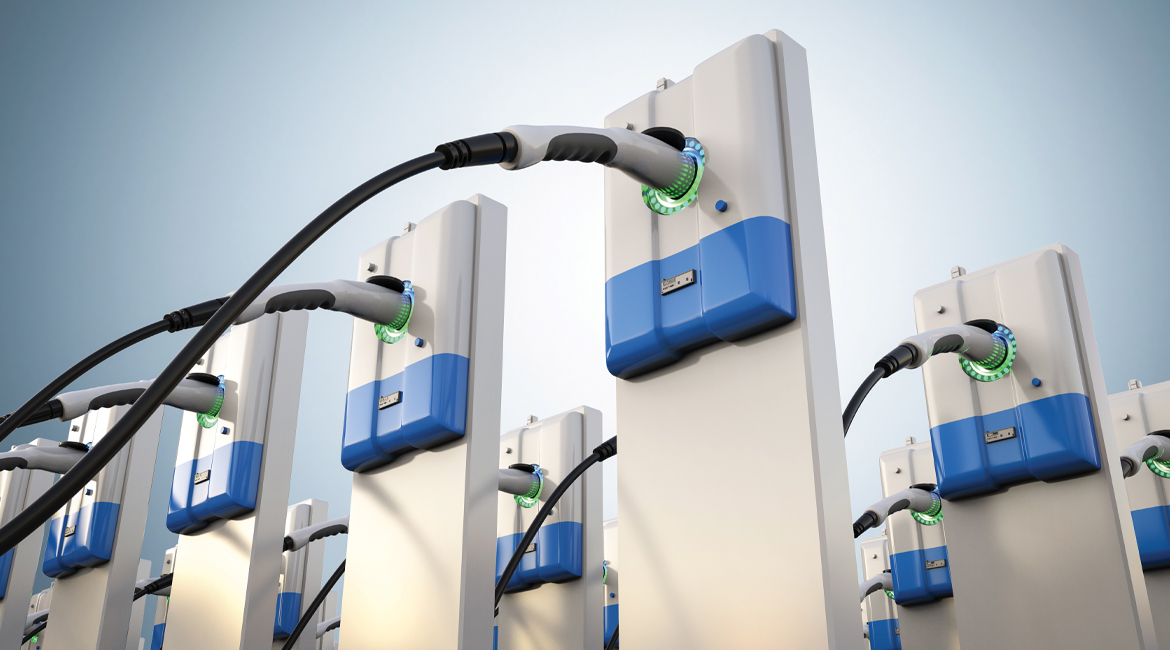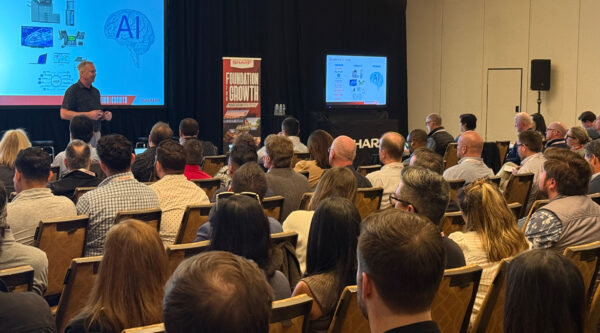The time has come for more dealers to plug into EV chargers.
The work-from-home revolution that started during the pandemic accelerated a problem many dealers have been quietly worrying about for years: People just don’t print as much anymore. Even in-office workers have less need to work with paper, especially if their coworkers are in the field or working remotely at home.
“In 2020 a lot of dealers were wondering what they were going to do next,” said Josh Lane, president and CEO of ACDI (Access Control Devices Inc.). “The sky was falling, pages disappearing, people not printing, and we said, what can we do?”
Most dealers have adjusted by investing in IT services, cybersecurity, and cloud solutions, just to name a few diversification opportunities. But for those looking to stay in hardware, there’s an emerging market that not everyone has considered: electric vehicle charging stations, also known as EV chargers.
“The idea was, who served the community better than our dealerships? Serving them with hardware and software, both have to be installed and supported and eventually could be refreshed,” said Lane.
“Once I studied it, it’s the exact same thing as a copier,” said Jim George, president of Donnellon McCarthy Enterprises in Cincinnati, Ohio. “There’s zero difference. I get the hardware sale upfront. I can also lease it, so I get leasing points on there, and once the customer has it, we provide monthly service for it.”
Electrical service can be an additional profit line, as the owner of the EV chargers sets the price, much like a vending machine. Deals can be set up so that the customer retains that profit, or the dealer keeps it in exchange for servicing the machines.
A good way for a dealer to determine if this is a product that could work for them and to get a sense of what customers look for is to install a couple of EV chargers at their dealership first for customer and employee use. Donnellon McCarthy was one of the first dealers in their area to install EV chargers at its offices, and the experience was valuable. “That gave me the opportunity to bid it out and get a better idea of what the pricing would look like and what all is entailed,” said George.
But this isn’t just like adding a new office product line. This is an entirely new industry, with utility hookups and government regulations to consider. An electrician must install EV chargers and charging stations, but the installation is relatively simple for someone trained and not unlike installing a 220v outlet for a clothes dryer at home. Many dealers build relationships with a local contractor to handle installations or support an in-house team.
So why is it so rare to see EV charger rollout done well?
“The number one failure problem today with chargers is service,” revealed Mark Hart, vice president of business development at ACDI. “It’s mission critical. And I think that that’s what we see the dealers do better than anyone else is that they’re there, they’re embedded in the community, and they have the teams to be able to go out and support and service.”
EV chargers are rated in levels based on charging speed. The most common are level two chargers, which can power up a typical electric vehicle in six to eight hours, perfect for offices or overnight charging at hotels. For a technician who’s mastered the thousands of moving parts and potential failure states of a modern office printer, level two chargers are a piece of cake. “When you really break down a charger, it’s a modem, it’s a card reader, it’s a power supply and a system board, stuff that dealers deal with on copiers every day,” said Hart.
“There’s only two things that can go wrong,” added George, “If it gets knocked offline, or the board went bad. A technician can take a thirty-minute course, and they’re certified to get it back online.” Despite this, any search on a map of charging stations will show that many EV chargers are non-operational at any given time, even in high-traffic areas.
The issue is, while maintenance on EV charging stations is simple enough for anyone already experienced in maintaining large electric devices, like office technology dealers, many of the early investors in EV chargers and charging stations had little experience with service-based businesses and were not willing or able to invest in skilled technicians and a regular maintenance schedule.
George recalled a conversation with some staffers at a large hotel chain whose EV chargers were offline. “They said, ‘Oh yeah, they’ve been down for months. They sold them to us, and they said they’re on warranty, so they’ll get out there at the first available time.'”
Any dealer should have no problem pitching better service than that. Why should customers put up with that kind of treatment when they could be enjoying the quick turnarounds and even same-day service any copier or printer client is used to?
The Client for EV Chargers
Think about businesses in your territory where people will likely park their cars for hours. Offices and shopping centers have potential, but some of the best customers are hotels, who know that electric-car-driving road trippers won’t stay anywhere that doesn’t have a place for them to charge, and golf courses, where most patrons are there for a minimum of four hours.
“Anywhere you’re spending over three to four hours, they can get a smaller [Level 2] station that, within that three to four hours, every car is fully charged. You don’t have to use the super [Level 3] machines,” said George. (Editor’s note: The difference between a Level 2 and Level 3 charging station is charging speed, cost [purchase and installation], and the infrastructure required to sustain the system.)
Adding EV chargers as an offering isn’t necessarily turning your back on your traditional lines of business either. Much like managed IT services and other consultative offerings, this is just another door to open to building a partnership with clients and becoming a load-bearing plank in their day-to-day operations.
“The biggest thing for us is that we want to create a network that invests together,” said Lane, “This is such a new industry, and technology is going to change constantly, so let’s work together, let’s build a model that works, and then see how we can scale it.”
Much as dealers have seen when pitching security equipment or COVID-19 safety tools, selling anything can open up a dialogue with a client that creates opportunities to introduce them to the rest of your product lines. With increased competition for both customers and workers lately, a convenient EV charging option is the kind of value-add many business owners are eagerly looking for.
“When our sales reps are out there cold calling, it’s very easy for them to get through the door bringing chargers up because it’s something new and a conversation that somebody wants to have,” said George. “A lot of them have gotten copier deals through the EV conversation. We’re going for the same buyer as the copier guy.”




